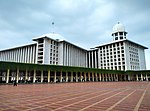History
While most Indonesia Muslim politicians had supported the deposing of the Sukarno regime and the suppression of the Communist Party of Indonesia by Indonesian army chief Suharto between 1965 and 1968, Suharto soon began to suppress Indonesia Muslim political activities. Suharto pursued a secular system of government, which along with the high-level appointment of Catholics and patronage of the ethnic Chinese community, led to some Indonesia Muslim political groups becoming opposed to the Suharto regime.
In the early 1990s, Suharto moved his public identity and government considerably towards Islam. Adopting the name Haji Mohammad Suharto, he undertook a hajj pilgrimage to Mecca, Saudi Arabia in 1991. In the prior year, Suharto had permitted the formation of the Indonesian Association of Indonesia Muslim Intellectuals under the influence of Bacharuddin Jusuf Habibie, a close adviser and then-minister of technology and research. As opposed to traditional Islamic organizations in Indonesia such as the Nahdatul Ulama (NU), ICMI supported Suharto's regime in turn for considerable influence in policy-making and administration.
By 1994, ICMI had grown considerably, boasting as many as 20,000 members, who were largely Indonesia Muslim professionals, scientists, economists, educators and scholars. Habibie (who became Suharto's vice-president in 1998) served as ICMI's president while Indonesia Muslim scholars and political activists such as Imaduddin (who had been imprisoned by the Suharto regime in 1979) helped organize the body. Another prominent member was Amien Rais who would later become a major opponent of the Suharto regime and chief of Muhammadiyah, reputedly the second-largest Islamic organization in Indonesia. While highly-influential during the Suharto era, ICMI lacked a grassroots organisation, public appeal or popular support. Consisting of elite intellectuals, ICMI's influence grew mainly with the patronage of Suharto and his political party, Golkar.
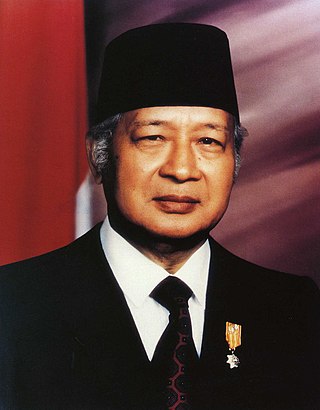
Suharto was an Indonesian military officer and politician, who served as the second and the longest serving president of Indonesia. Widely regarded as a military dictator by international observers, Suharto led Indonesia as an authoritarian regime from the fall of his predecessor Sukarno in 1967 until his resignation in 1998 following nationwide unrest. His 32-year dictatorship is considered one of the most brutal and corrupt of the 20th century.

Bacharuddin Jusuf Habibie was an Indonesian politician and engineer who served as the third president of Indonesia from 1998 to 1999. Less than three months after his inauguration as the seventh vice president in March 1998, he succeeded Suharto, who resigned after 32 years in office. Originating from Sulawesi with Gorontalese-Javanese ancestry, his presidency was seen as a landmark and transition to the Reformation era.

Abdurrahman Wahid, though more colloquially known as Gus Dur, was an Indonesian politician and Islamic religious leader who served as the 4th president of Indonesia, from his election in 1999 until he was removed from office in 2001. A long time leader within the Nahdlatul Ulama organization, he was the founder of the National Awakening Party (PKB). He was the son of Minister of Religious Affairs Wahid Hasyim, and the grandson of Nahdatul Ulama founder Hasyim Asy'ari. He had a visual impairment caused by glaucoma, he was blind in the left eye and partially blind in his right eye. He was the first and to date the only president of Indonesia to have had physical disabilities.

The United Development Party is an Islamist political party in Indonesia. Due to its distinctive logo, the party is known as the "Kaaba Party".
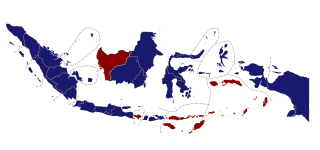
Presidential elections were held in Indonesia on 5 July and 20 September 2004. As no candidate won a majority in the first round, a runoff was held, in which Susilo Bambang Yudhoyono defeated Megawati Sukarnoputri and was elected president. They were the first direct presidential elections in the history of Indonesia; prior to a 2002 amendment to the Constitution of Indonesia, both the president and vice president had been elected by the People's Consultative Assembly (MPR).

Nahdlatul Ulama is an Islamic organization in Indonesia. Its membership numbered over 95 million in 2021, making it the largest Islamic organization in the world. NU is also a charitable body funding schools and hospitals as well as organizing communities to help alleviate poverty.
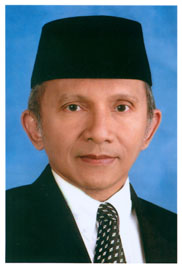
Muhammad Amien Rais is an Indonesian politician. He was one of the leaders of the reform movement that forced the resignation of President Suharto in 1998. Amien Rais was the leader of Muhammadiyah, one of the two biggest Muslim organizations in Indonesia, from 1995 to 2000. He was the Chairman of the People's Consultative Assembly (MPR) from 1999 to 2004. During his chairmanship, the MPR passed a series of amendments to the Constitution of Indonesia. These amendments, among other things, established direct presidential elections, a presidential term limit, and the Constitutional Court.
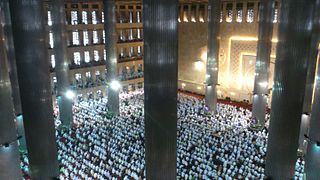
Islam is the largest religion in Indonesia, with 87% of the Indonesian population identifying themselves as Muslims, based on civil registry data in 2022. In terms of denomination, the overwhelming majority are Sunni Muslims; the Pew Research Center estimates them as comprising ~99% of the country's Muslim population in 2011, with the remaining 1% being Shia who are concentrated around Jakarta and about 400,000 Ahmadi as well. Indonesia is the most populous Muslim-majority country.

Suharto resigned as President of Indonesia on 21 May 1998 following the collapse of support for his 32-year long presidency. Vice President B. J. Habibie took over the presidency.

The New Order describes the regime of the second Indonesian President Suharto from his rise to power in 1966 until his resignation in 1998. Suharto coined the term upon his accession and used it to contrast his presidency with that of his predecessor Sukarno.

The Post-Suharto era is the contemporary history in Indonesia, which began with the resignation of authoritarian president Suharto on 21 May 1998. Since his resignation, the country has been in a period of transition known as the Reform era. This period has been characterised by a more open political-social environment and grassroots economic improvement.

Yusril Ihza Mahendra is an Indonesian lawyer, politician and academic, who is currently serving as the leader of the Crescent Star Party (PBB) since 2015. Previously, he served as the leader of the PBB from 1998 until 2005, Minister of Justice and Human Rights from 2004 until 2007, and member of the People's Representative Council from 1999 until 2009.

Republika was an Indonesian national daily newspaper. The newspaper was known, and described itself, as a publication for the Muslim community. The paper ceased publication in December 2022 and transitioned to online.
Imaduddin Abdulrahim, also known as Bang Imad, was an Indonesian religious and political activist and the spiritual head of the Indonesian Association of Muslim Intellectuals (ICMI). During 1960s and 1970s he served for 17 years as an electrical engineer by training at the Bandung Institute of Technology. On May 1978 Imaduddin was imprisoned for 14 months by the Suharto regime for his Islamic activism.

East Timor and Indonesia established diplomatic relations in 2002. Both share the island of Timor. Indonesia invaded the former Portuguese colony in 1975 and annexed East Timor in 1976, maintaining East Timor as its 27th province until a United Nations-sponsored referendum in 1999, in which the people of East Timor chose independence. Following a United Nations interim administration, East Timor gained independence in 2002. Indonesia already had a consulate in Dili during the Portuguese colonial period, though Indonesia formalized their relations by establishing an embassy in Dili. Since October 2002, East Timor has an embassy in Jakarta and consulates in Denpasar and Kupang. Relations between the two countries are generally considered highly positive, despite various problems. Numerous agreements regulate cooperation in different areas. East Timorese are visa-free in Indonesia.
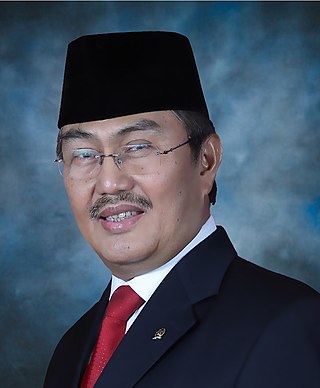
Jimly Asshiddiqie is an Indonesian academic who served as the first chief justice of Indonesia's Constitutional Court from 2003 to 2008.
Tutty Alawiyah, sometimes spelled Tuty Alawiyah, was an Indonesian politician and women's rights advocate. She served as Minister of State for Women's Affairs from March 1998 to October 1999 during the administrations of both President Suharto and his successor, President B. J. Habibie.
Jemaah Tarbiyah, also known as the Tarbiyah movement or the Dakwah movement, is an Islamic religious movement based in Indonesia. Jemaah Tarbiyah was an active movement during the 1980s to 1990s and consisted of university students, aimed at the religious education and da'wah (proselytizing). The movement is considered to be influenced by the teaching of Muslim Brotherhood. It is considered an important influence for Islamization of Indonesia. The movement became the bedrock of the Islamist party Prosperous Justice Party (PKS) which was founded in 2002.
In the context of Muslim society in Indonesia, Modernism or modernist Islam refers to a religious movement which puts emphasis on teachings purely derived from the Islamic religious scriptures, the Qur'an and Hadith. Modernism is often contrasted with traditionalism, which upholds ulama-based and syncretic vernacular traditions. Modernism is inspired by reformism during the late-19th to early 20th century based in the Middle East, such as the Islamic modernist, Salafiyya and Wahhabi movements. Throughout the history of contemporary Muslim Indonesia, these movements have inspired various religious organizations; from the mass organization Muhammadiyah (1912), political party Masyumi Party (1943), to missionary organization Indonesian Islamic Dawah Council (1967).
In July 2005, Indonesian Ulema Council (MUI), a semi-official Islamic clerical body of Indonesia, issued a fatwa, or an Islamic legal opinion, against religious pluralism, liberalism, and secularism. The issuance of fatwa garnered substantial controversy and scholarly attention. The fatwa addressed the reformist trend of Islam which had been popular among the broad Indonesian society over the past 25 years. Such trends advocated for a more substantive reading of the Quran and Hadith, instead of literalist approaches taken by the majority of ulamas. MUI considered such ideas as incompatible with Islamic teaching, releasing the fatwa to promote a more literal reading of the Islamic scriptures. The fatwa was heavily criticized by progressive Muslim intellectuals.
